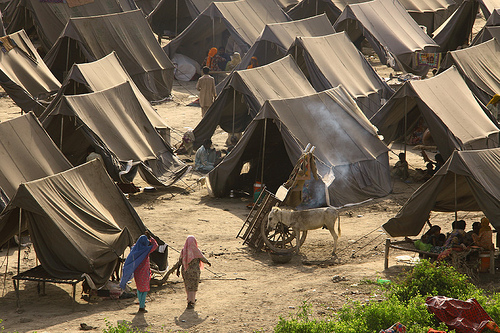Five million people were affected by the tsunami, three million by the 2005 earthquake, and three million by the Haiti earthquake.
Despite the scale and severity of the flood crisis, the lack of international support is quite extraordinary. In the words of a senior UN official, ‘right now, our level of need in terms of funding is huge compared to what we’ve been receiving – even though this is the largest, by far, humanitarian crisis we’ve seen in decades.’
The slowness of contributions from the international community, along with the inability of the government to tackle the crisis, is raising questions in the minds of those affected. Most of them are already poor and the floods have plunged them further into deprivation, in addition to rendering them homeless. The government, along with the international community, has been accused of moving too slowly. At the same time, some charities with suspected links to militant groups have promptly provided relief to Pakistanis already frustrated with their leaders’ track records on security, poverty and chronic power shortages. Hidayatullah Bokhari, a 45-year-old farmer, reported ‘we used to think they were terrorists but that’s not right. They were the first who came to help us’.
Given the scale of catastrophe and sluggish international support, a new battle has begun. Whoever moves first will reap the benefits. The battle can appropriately be labelled the ‘battle of hearts’, where the objective is to win the allegiance of Pakistanis, especially the vulnerable ones. It is not a resource-based battle fought with might and military power. In fact, the battle involves only a meagre amount of resources; its centre is the supply of basic necessities. The Pakistani military’s recent operation against the Taliban in the Swat valley, where people joined hands with Pakistan military forces, demonstrated that in this kind of a war, success lies in winning the hearts of people and not merely in winning through force. This is the time for the international community to act swiftly, making itself visible to a Pakistani community on its knees. Donor countries and organisations need to help, and to be seen to be helping, people who are vulnerable.
The full devastation of the flooding is yet to be revealed. As water begins to recede, there will be a wave of water-borne diseases and food shortages. It is expected that GDP growth will be zero per cent this fiscal year and inflation will be 25 per cent. These economic consequences will hit poor people the hardest. Although the IMF and ADB will take a few more weeks to estimate the full economic costs of the floods, their initial assessment of huge losses to almost every sector of the economy is deeply disturbing.
Consider in more detail Pakistan’s agriculture, industry, infrastructure and exports.
The livelihood of the Pakistani population in rural areas heavily depends on agriculture. Floods have rendered useless almost 20 per cent of the agricultural land. The main crops, including wheat, cotton, rice, maize and sugarcane have suffered huge losses. According to the Ministry of Food and Agriculture, the country has lost half a million tonnes of wheat, 1.6 million tonnes of rice paddy, 7.6 million tonnes of sugarcane and 2-3 million bales of cotton. Crop losses are estimated at US$2.8 billion, 15-20 per cent of their total output. These losses will increase existing inflationary pressures and increase food shortages.
Industrial production was already suffering from high energy prices and power outages. The floods have struck another blow, with the shutdown of a major gas field and four power plants taking out 1500 megawatts in addition to the existing shortfall of 4500 megawatts. The drop in agricultural production will also spill over to the industrial sector, as agriculture still accounts for a large share of economic activity in the industrial sector.
Floodwaters have damaged roads, bridges, communications networks, power plants and electricity transmission infrastructure. Thousands of villages and towns are without electricity. Furthermore, twenty per cent of the health facilities in the country are destroyed, 5457 schools and around one million houses are gone. It will take many years and billions of dollars to rebuild and repair the damage.
Three quarters of Pakistan’s total exports comprises textiles and agriculture. The loss of 2-3 million bales of cotton, undermining textile exports, coupled with rice crop, wheat and maize losses, will mean a large drop in the exports this year. Pakistan will have to import cotton and agricultural products, which will worsen the external deficit.
Even though the expected damage to the economy may run into billions of dollars, the apathy reflected in the collection of immediate relief funds for medicines and potable water is a worry. Currently, the struggle to win the trust of the Pakistani nation is being fought on a soft battleground, in the hearts of the vulnerable who require meagre resources. With the passing of time, the battle may shift to a harder and more unforgiving battleground, consuming far more resources. A dollar spent now is likely to be equivalent to thousands spent later. The international community must act to win the battle of hearts.
Adil Khan Miankhel is Associate lecturer at Research School of Economics and Shahbaz Nasir is postgraduate student at Crawford School of Economics and Government, Australian National University.


I have made this documentary on the Pakistan flood, pretty moving stuff:
http://www.youtube.com/watch?v=hGnUlKIsN48